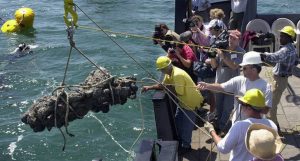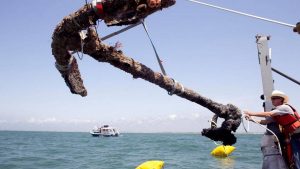Rick Allen has plunged to the depths of the Atlantic Ocean to photograph and videotape the salvaging of Queen Anne’s Revenge, Blackbeard’s ship that sank off the North Carolina coast 300 years ago.
Now the videographer is on a different kind of salvaging mission. He’s doing what he can to keep copyright infringement claims afloat that he made in a federal lawsuit several years ago against the governor, the state Department of Cultural Resources and other state officials.
On Tuesday, the U.S. 4th Circuit Court of Appeals ruled against Allen, who has spent much of the past couple of decades documenting the retrieval of the notorious pirate’s ship.
Circuit Judge Paul V. Niemeyer wrote a 65-page opinion that was signed by Circuit Judge Robert Bruce King and U.S. District Judge Leonie Brinkema, who was designated to sit in on the case.

The judges ruled unanimously for North Carolina, and sent the case back to the lower court to be dismissed.
“We plan to appeal,” Allen said Tuesday afternoon, while waiting for tropical storm Chris to stop roiling the waters off of Cape Lookout where he had planned to go diving.
The battle over Blackbeard’s sunken treasure and who owns copyright over images shot by Allen and his company, Nautilus Productions, began three years ago.
The former TV news cameraman contends a law adopted in 2015 by the General Assembly, and signed by Pat McCrory, the governor at the time, robs him of a bounty he could make this year as events are held to commemorate the 300th anniversary of the sinking of the 300-ton frigate and Blackbeard’s subsequent death.
The legislation, which Allen has described as “Blackbeard’s law,” states that “all photographs, video recordings, or other documentary materials of a derelict vessel or shipwreck,” as well as “relics, artifacts or historic materials” in the custody of a state agency, shall be public records.
Allen claimed in his lawsuit that the 2015 law converted works he had copyrighted to public records and made it so he could not reap the financial rewards from them that he thought he should.
Queen Anne’s Revenge was discovered in 1996 by Intersal, a Florida-based salvaging company. Intersal negotiated the rights to t the sunken treasure with the state two years later.
In the 1998 agreement, Intersal contended it traded any rights to three quarters of the treasure in exchange for exclusive media and replica rights. Allen, an independent contractor, did much of the video and photographic work.
In 2013, the state Department of Natural and Cultural Resources did not renew the agreement, though Intersal and the state agreed later that year to share media and replica rights.
In a lawsuit filed by Intersal in state court, the salvagers claimed an $8 million breach of contract. The suit argued that the state contracted with an organization called The Friends of Queen Anne’s Revenge, which then brought in other media groups.
Allen’s lawsuit took a different legal tack and contends the state law adopted after the Intersal lawsuit was filed violated federal copyright law. Allen said some of his images have been posted on websites without his approval.
In the ruling issued on Tuesday, the three-judge panel noted that those images have been taken down.
But some of Allen’s other images have been used on state websites.
“There’s a great deal of footage that has not been posted,” Allen said.

He has images of divers finding cannons and other treasures from the ship run aground at Beaufort Inlet.
“For many of us, we’re the first people to touch these artifacts since Blackbeard himself,” Allen said. “There’s a lot to see. It’s a loss for everyone.”
It was June 10, 1718, when Blackbeard, or Edward Teach as he was also known, ran the Queen Anne’s Revenge aground and transferred its crew and supplies to other ships.
The pirate, known for his swagger and lighting candles in his beard to instill fear, later surrendered to North Carolina’s Gov. Charles Eden and promised to change his ways.
But it was not long before Blackbeard began pirating again, hiding in the Outer Banks inlets and robbing ships and others of their treasures.
He was killed Nov. 22, 1718.
Though Allen contends the looting that often comes to mind when Blackbeard’s name is mentioned has not stopped, the three-judge panel found otherwise.
Source: charlotteobserver
Ask me anything
Explore related questions





